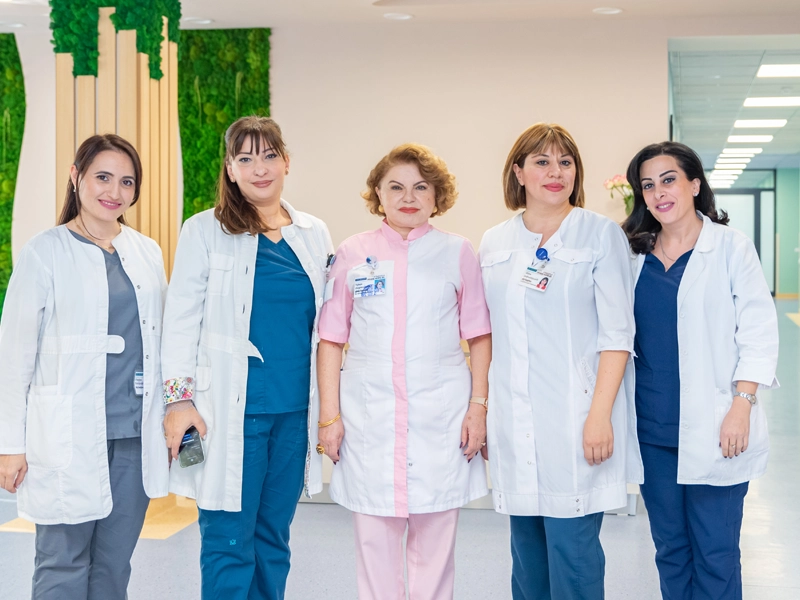The Department of Gastroenterology and Hepatology of Erebouni Medical Centre implements the diagnostics and the treatment of digestive system and liver diseases.
Esophageal diseases
- Gastroesophageal reflux disease
- Esophagitis Differential
- Barrett's esophagus
- Cardiospasm
- Esophagospasm
- Stomach diseases,Acute and chronic gastritis
Ulcer diseases
- Gastric and duodenal ulcers
- Inflammatory bowel diseases, Nonspecific ulcerative colitis
- Crohn's disease
- Small intestine diseases- enteritis, Whipple disease
Liver diseases
- Hepatitis – viral, alcoholic, non-alcoholic or fatty liver, autoimmune and drug induced
- Cirrhosis differential
- Pancreatitis, Chronic pancreatitis
- Autoimmune pancreatitis
- Bile Duct Diseases – chronic cholecystitis, cholangitis, etc.
The fact, that digestive system and liver diseases often become chronic, deserves special attention, as well as contribute to the emergence of allergic reactions, many skin diseases, joints, endocrine system and the occurrence of food intolerance. This can have a significant impact on quality of life, reducing the working capacities up to causing depression, leading to the occurrence of cholelithiasis and urolithiasis, diabetes and other diseases.
Therefore, it is necessary and important timely begin treatment of patients by specialists. The earlier treatment is started, the more effective it is that makes it possible to avoid the recurrence of the disease in the future.
Indications for patients to apply to specialized consultation and treatment of gastroenterologist are:
- Heartburn, nausea, vomiting, bitter taste and dryness in the mouth
- Presence of abdominal pains
- Appetite loss
- Weight loss
- Intestinal disorders (diarrhea, constipation, bloating, sense of discomfort in the lower parts of abdomen, pain and anal itching)
- Noticeable changes in color of skin and mucous membranes, yellowness
During inpatient treatment of gastroenterological diseases the diet therapy and drug therapy in specific disorders are used. On the basis of the individual characteristics of the human body and the results of all diagnostics tests an individual treatment schedule is developed for each patient in which the daily routine, lifestyle and dietary patterns are taken into consideration.In its diagnostic and treatment activities the department of gastroenterology is working closely with specialists from other specialized departments of MC Erebouni: endoscopy, general and abdominal surgery, endocrinology, minimally invasive surgery, and others. In case, if during diagnostic examination of the patients are revealed the situation or disease which requires surgical correction and treatment (e.g. cholelithiasis or a peptic ulcer), patients are transferred to the appropriate department, where they undergo highly qualified surgical treatment, such as open or minimally invasive or laparoscopic surgery.
Phone number of Gastroenterology and Hepatology Department: 015 472318
Price list
40,000
20,000
40,000
45,000
20,000
25,000
50,000
20,000
25,000
35,000
5,000
25,000
Tips before a medical examination
Preparation for a Gastroscopy
To prepare for a gastroscopy, it is recommended that your evening meal the day before the examination consists of easy-to-digest foods, such as mashed potatoes or steamed broccoli.
Here are some key guidelines to follow:
- Avoid consuming alcoholic beverages.
- Your last meal should be completed by 18:00 the day before the examination.
- Ensure your dinner is substantial but free of hard-to-digest foods.
- Do not eat or drink anything prior to the examination.
- You may drink a small amount of water no later than 2-4 hours before the examination.
- Delay taking any medications in capsule or tablet form.
If you have a history of allergies, especially to medications, please inform your doctor.
If you have undergone prior research or received inpatient treatment related to this issue, it is advisable to bring any relevant medical reports and results.
To undergo the examination under a government order or insurance, you must coordinate compensation with the appropriate department; otherwise, the procedure will be available only on a paid basis.
Dietary Guidelines to Follow 2-3 Days Before the Examination:
You may consume protein-rich foods, including:
- Stewed meat and poultry (excluding smoked varieties)
- Non-fatty fish
- Low-fat dairy products
- Eggs
- Sugar and honey
- Fruit jelly
Allowed liquids include:
- Filtered broth
- Water, tea, non-alcoholic beverages
- Coffee without milk
- Natural juice without berries
All plant-based foods are prohibited, including:
- Vegetables
- Fruits
- Berries
- Greens
- Legumes
- Nuts
- Cereals
- Bread products
Additionally, the following items are not allowed:
- Colored juices
- Alcoholic beverages
- Carbonated drinks
Prior to the examination, it is essential to perform bowel cleansing. Please consult your attending physician for the appropriate medication regimen and other details.
If the examination is conducted under a government order or insurance, please arrange for compensation with the relevant department; otherwise, the procedure will only be available on a paid basis.


